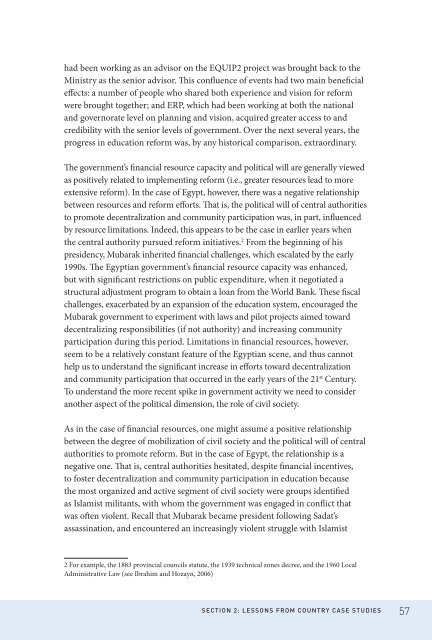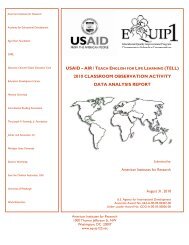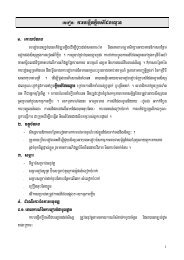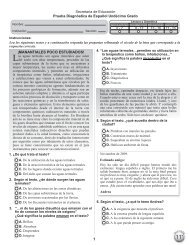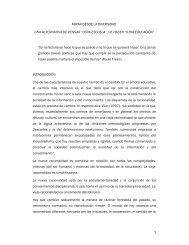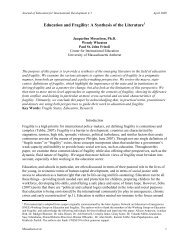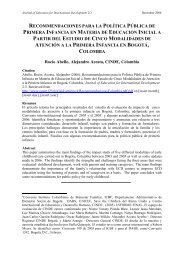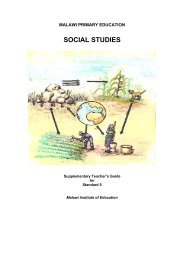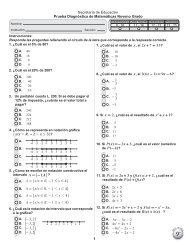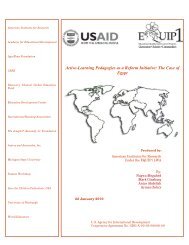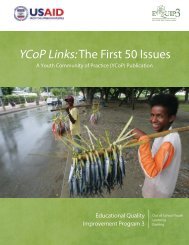The Power of Persistence: Education System ... - EQUIP123.net
The Power of Persistence: Education System ... - EQUIP123.net
The Power of Persistence: Education System ... - EQUIP123.net
Create successful ePaper yourself
Turn your PDF publications into a flip-book with our unique Google optimized e-Paper software.
had been working as an advisor on the EQUIP2 project was brought back to the<br />
Ministry as the senior advisor. This confluence <strong>of</strong> events had two main beneficial<br />
effects: a number <strong>of</strong> people who shared both experience and vision for reform<br />
were brought together; and ERP, which had been working at both the national<br />
and governorate level on planning and vision, acquired greater access to and<br />
credibility with the senior levels <strong>of</strong> government. Over the next several years, the<br />
progress in education reform was, by any historical comparison, extraordinary.<br />
<strong>The</strong> government’s financial resource capacity and political will are generally viewed<br />
as positively related to implementing reform (i.e., greater resources lead to more<br />
extensive reform). In the case <strong>of</strong> Egypt, however, there was a negative relationship<br />
between resources and reform efforts. That is, the political will <strong>of</strong> central authorities<br />
to promote decentralization and community participation was, in part, influenced<br />
by resource limitations. Indeed, this appears to be the case in earlier years when<br />
the central authority pursued reform initiatives. 2 From the beginning <strong>of</strong> his<br />
presidency, Mubarak inherited financial challenges, which escalated by the early<br />
1990s. <strong>The</strong> Egyptian government’s financial resource capacity was enhanced,<br />
but with significant restrictions on public expenditure, when it negotiated a<br />
structural adjustment program to obtain a loan from the World Bank. <strong>The</strong>se fiscal<br />
challenges, exacerbated by an expansion <strong>of</strong> the education system, encouraged the<br />
Mubarak government to experiment with laws and pilot projects aimed toward<br />
decentralizing responsibilities (if not authority) and increasing community<br />
participation during this period. Limitations in financial resources, however,<br />
seem to be a relatively constant feature <strong>of</strong> the Egyptian scene, and thus cannot<br />
help us to understand the significant increase in efforts toward decentralization<br />
and community participation that occurred in the early years <strong>of</strong> the 21 st Century.<br />
To understand the more recent spike in government activity we need to consider<br />
another aspect <strong>of</strong> the political dimension, the role <strong>of</strong> civil society.<br />
As in the case <strong>of</strong> financial resources, one might assume a positive relationship<br />
between the degree <strong>of</strong> mobilization <strong>of</strong> civil society and the political will <strong>of</strong> central<br />
authorities to promote reform. But in the case <strong>of</strong> Egypt, the relationship is a<br />
negative one. That is, central authorities hesitated, despite financial incentives,<br />
to foster decentralization and community participation in education because<br />
the most organized and active segment <strong>of</strong> civil society were groups identified<br />
as Islamist militants, with whom the government was engaged in conflict that<br />
was <strong>of</strong>ten violent. Recall that Mubarak became president following Sadat’s<br />
assassination, and encountered an increasingly violent struggle with Islamist<br />
2 For example, the 1883 provincial councils statute, the 1939 technical zones decree, and the 1960 Local<br />
Administrative Law (see Ibrahim and Hozayn, 2006)<br />
SECTION 2: lESSONS fROM COUNTRY CASE STUdIES<br />
57


